I’m taking you behind the scenes of a particularly tough keyword research brief we tackled. I’ll break down our approach, share our strategies, and reveal how we executed the research with a dash of our signature flair.
By the end of this, you’ll have a blueprint for navigating complex keyword research, particularly in the tricky business-to-business (B2B) space.
Why Is Keyword Research For B2B Businesses So Difficult?
Diving into keyword research for B2B businesses can feel like navigating a labyrinth.
Unlike the business-to-customer (B2C) world, the B2B landscape is often less straightforward, marked by niche markets, specialized vocabularies, and decision-making that involves multiple layers of approval.
The complexity ramps up as you aim to connect with a more targeted, savvy audience that’s well-versed in industry jargon and seeking specific, detailed information.
That’s why crafting an effective keyword strategy in the B2B arena is not just about hitting the right search terms; it’s about unlocking the unique language of industries and professionals who demand depth and precision.
Picture this: You’re on the hunt for the perfect keywords for a company that’s all about providing other businesses with underground broadband cables.
At first glance, you might think, “What can I possibly say about ‘business-grade cabling’ that’s going to pop on the content scene?” It’s a niche market, and the chances of stumbling upon a trove of content just waiting to be written might seem slim.
But as I’ll show you in this guide, and as I often muse about over on my Twitter feed (X), the secret sauce is a deep understanding of your audience.
The Brief
We faced a real head-scratcher with a brief from a B2B health brand. The team threw down the gauntlet, challenging us to unearth keywords that would be on the radar of healthcare professionals exclusively.
They hit us with a slew of health subcategories, but for the sake of this discussion, let’s zoom in on just one slice of that pie: “sore throats and colds.”
Here’s the crux of the challenge: it’s easy to generate a massive list of keywords related to sore throats – the possibilities are nearly endless.
But the real conundrum is sifting through that mountain of options to pinpoint the precise terms that a healthcare pro, not just any layperson, would punch into their search bar.
How do we filter the ocean of potential keywords to catch those select few that clinicians are hunting for? Let’s dive into that.
Know Your Audience, Form A Hypothesis
To kick things off, we laid out four key hypotheses about search behavior and our target audience:
- Medical experts are likely to turn to certain websites or journals for specialized information. If such websites are frequently visited by these experts, it strongly indicates that the content they produce resonates with healthcare professionals. This inference is particularly valid for subscription-based websites that primarily focus on health-related subjects, as it’s likely that healthcare professionals would actually pay to read the content on them.
- Our game plan includes zeroing in on these paywalled health sites beloved by medical insiders. By figuring out which keywords they rank for, we can make an educated guess that these are the same keywords healthcare professionals are looking for. After all, it stands to reason that these niche, subscription-only sites tailor their content to the searches of those in the know.
- Here’s where Google’s algorithm waltzes in. It’s all about user satisfaction – if a page consistently satisfies search queries, Google tends to reward it with a higher rank. So, if these premium medical journals are topping the charts for certain keywords, it’s a strong hint that their readers, who are likely subscribed and not bouncing back to Google, are the medical mavens themselves.
- Leveraging this insight, we aim to sift through the sea of medical keywords to find the pearls – those specific terms that healthcare professionals, not the general public, are entering into their search bars.
So, we began by identifying top-tier healthcare experts and the social accounts/websites they visit. Tools like SparkToro or SimilarWeb offer great features to pull these insights.
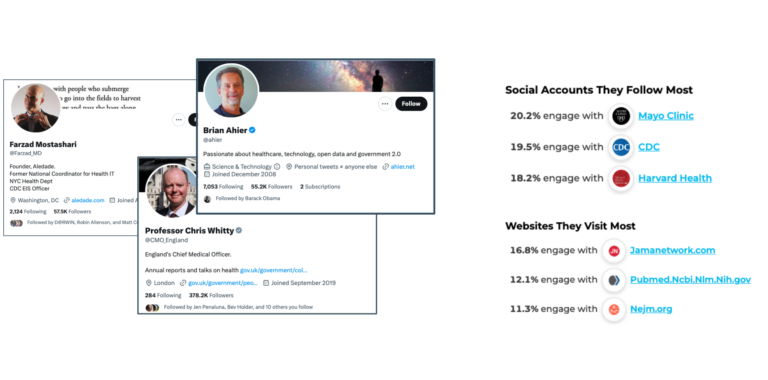 Screenshot from author, November 2023
Screenshot from author, November 2023Once we had a list of all the top medical sites, we narrowed our list to only those where a subscription was needed (i.e., the ones most likely to be visited by only healthcare professionals).
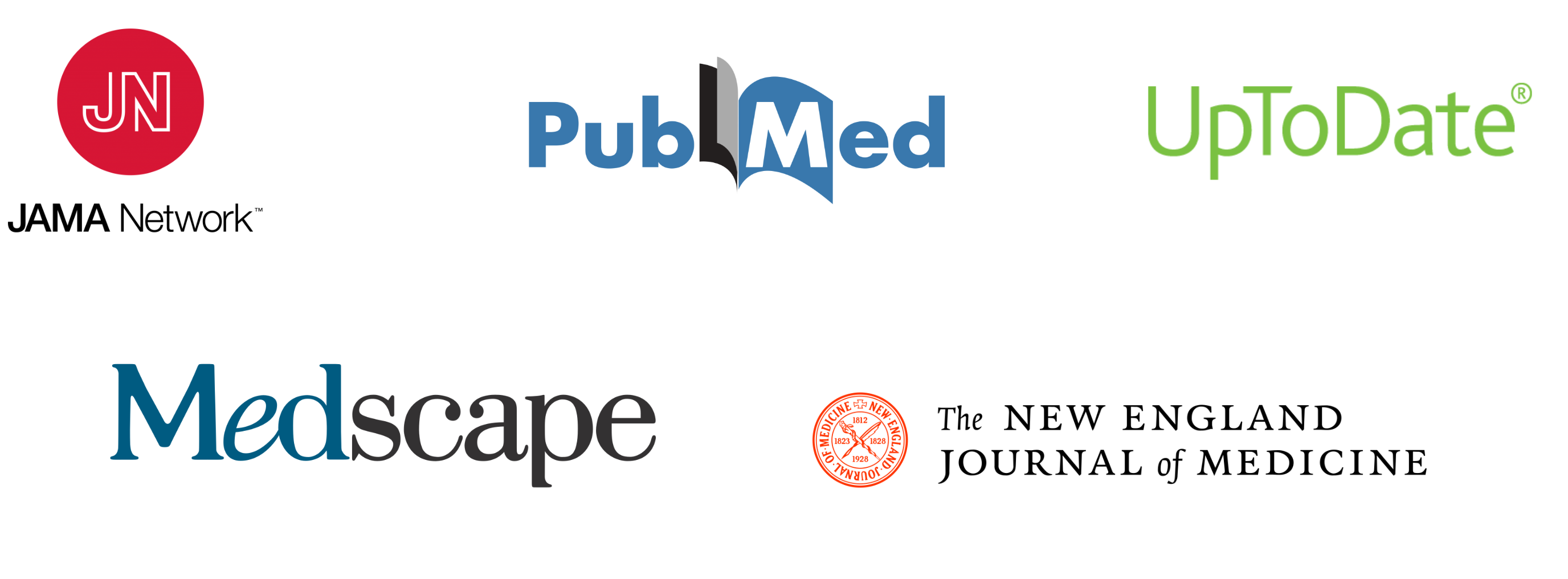 Screenshot from author, November 2023
Screenshot from author, November 2023Keywords that ranked highly (positions 1-30) across all prominent, subscription-only medical sites were of particular interest.
These are presumably the keywords that our healthcare professionals are most likely to search for due to the fact they rank well on Google. Refer back to point three of my hypothesis if this doesn’t make sense.
Take a look at the Venn diagram below. It captures all the keywords for which five key medical sites secure rankings anywhere from positions 1 to 30.
My focus is squarely on the cluster of keywords at the very heart of this diagram. To underscore my earlier point, these are the keywords that are doing well across subscription-only medical sites.
Given the way Google’s algorithm rewards relevance and user satisfaction, it stands to reason that these particular keywords are the ones healthcare professionals are searching for.
If they weren’t so specialized, you’d expect to see more generalist, consumer-focused sites like WebMD, Mayoclinic, or NHS.uk (if you’re in the UK) dominating those ranks.
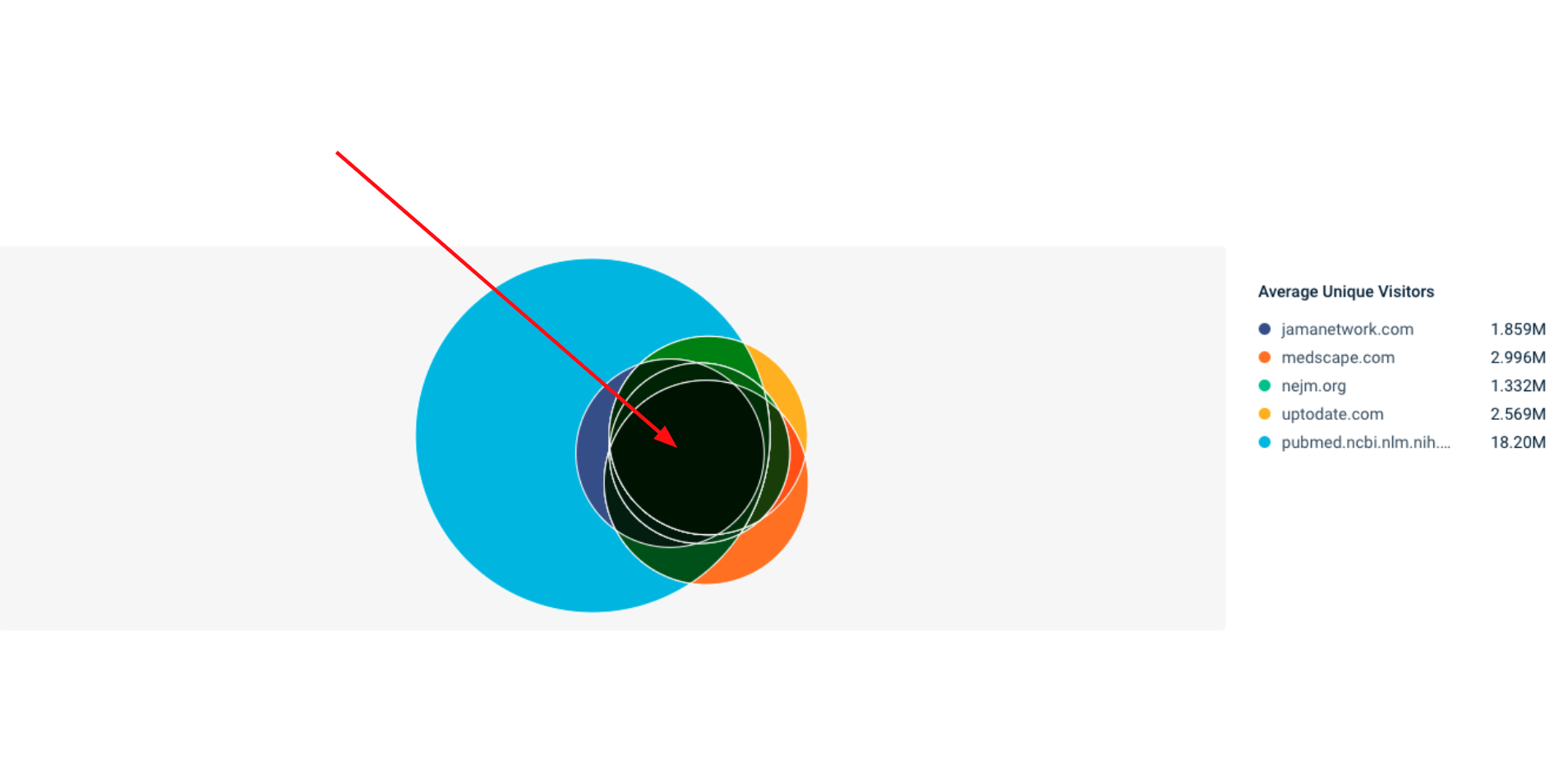 Image by author, November 2023
Image by author, November 2023Once we pulled all those keywords, the next challenge was sorting them.
Sorting Your Keywords
There were about 800,000 “shared” keywords between the five medical sites.
We now needed a scalable way of pulling only those keywords that had to do with our client’s specified category, “sore throats and colds.”
To do this, we used our own keyword clustering technology and combined it with Open AI’s text classifier to quickly group our keywords into something that made more sense for the analysis. (Please note that I am one of the co-founders of Keyword Insights – there are other clustering tools available.)
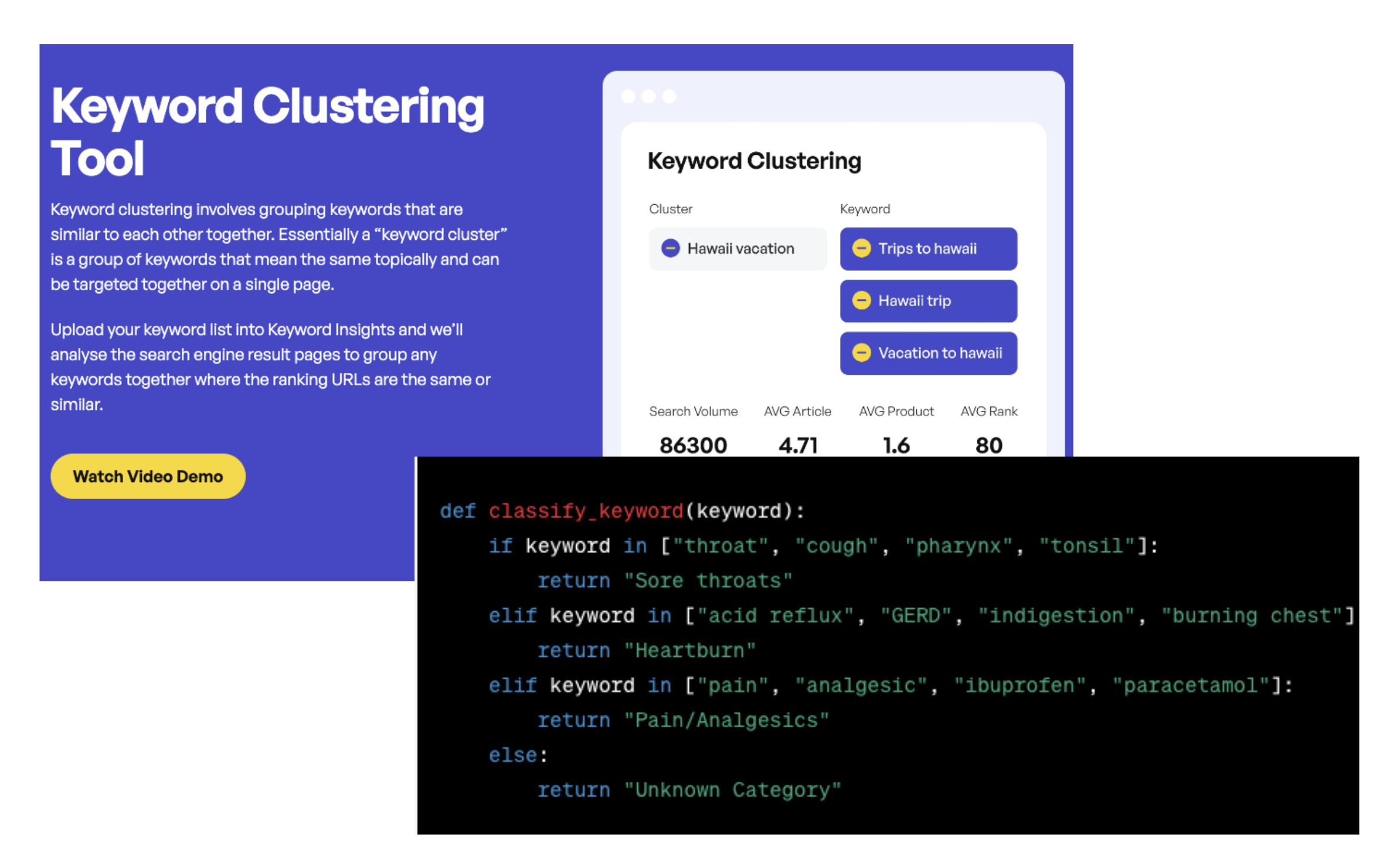 Screenshot from Open AI, November 2023
Screenshot from Open AI, November 2023How to write such a script is out of the scope of this article, but if you wanted an easier way to do this, you could perhaps do some variation of the following steps:
- Cluster the terms first. It’ll turn your list of 800,000 keywords into a much smaller list of, say, 100,000 keywords (because similar keywords will be grouped together).
- Take your smaller list of 100,000 keywords and upload them into an AI software that allows you to upload big files, like Claude AI.
- Obviously, your prompt will be key here, but you’re basically asking it to label only the keywords that fit within the category of keywords you’re looking for, which has a high degree of confidence. Label all others “other.” In this instance, my category would have been “anything to do with sore throats, coughs, tonsils,” etc.
- Once you have your list of “sore throat” and “cold” based keywords (or whatever your category is), use Excel or Google Sheets to V-lookup all the other keywords back in to “re-build” your clusters again.
Once we had our list of sore throat and cold-based keywords, to maximize the likelihood of isolating keywords that are uniquely typed by healthcare professionals, we decided to introduce a scoring system.
This ‘keyword score’ would be calculated by examining the ranking positions of each keyword across the five targeted medical sites.
A keyword climbing higher on this score ladder indicates a stronger probability that it’s of particular importance to healthcare pros.
To put it plainly, if we spot a keyword consistently hitting the top five positions exclusively on subscription-only medical sites, it’s a safe bet that this term is pretty much the insider lingo of medical experts.
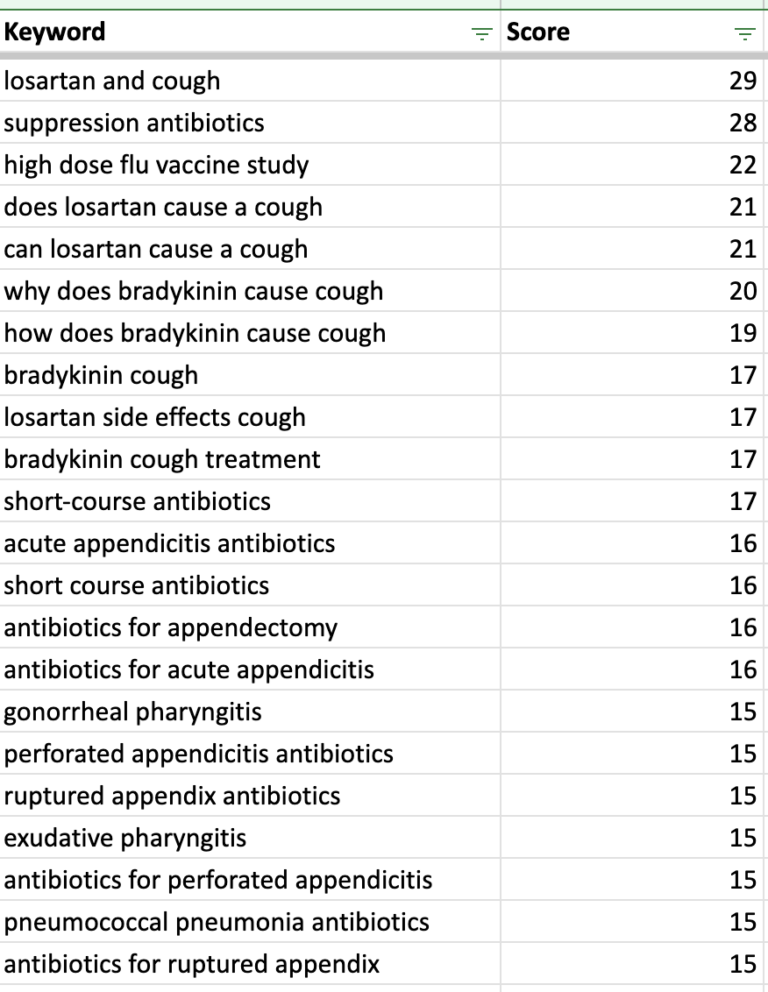 Screenshot from author, November 2023
Screenshot from author, November 2023After this step, I combined all the data and dumped it into Google Sheets, where I made a simple pivot table.
The Result
A neatly organized pivot table with important keywords highly likely to be searched for exclusively by health care professionals, categorized, grouped together, and with their search volumes and trend data provided where possible.
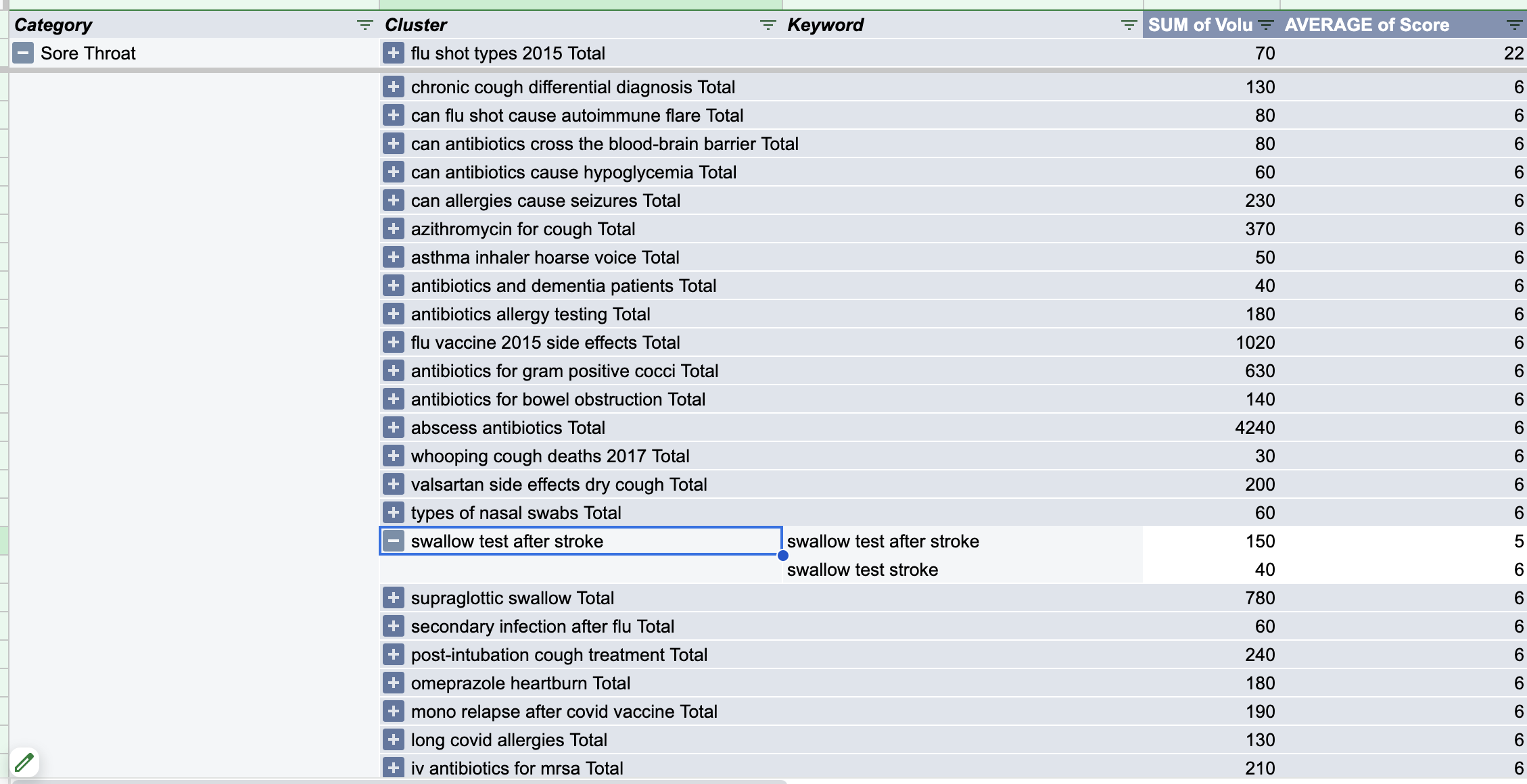 Screenshot from author, November 2023
Screenshot from author, November 2023Encouragingly, when we looked at a lot of the terms, they were very technical, which sort of proved our hypothesis.
As we can see in a few examples below, healthcare professionals were looking at things like “which the best antibiotic to prescribe would be for a range of throat infections.”
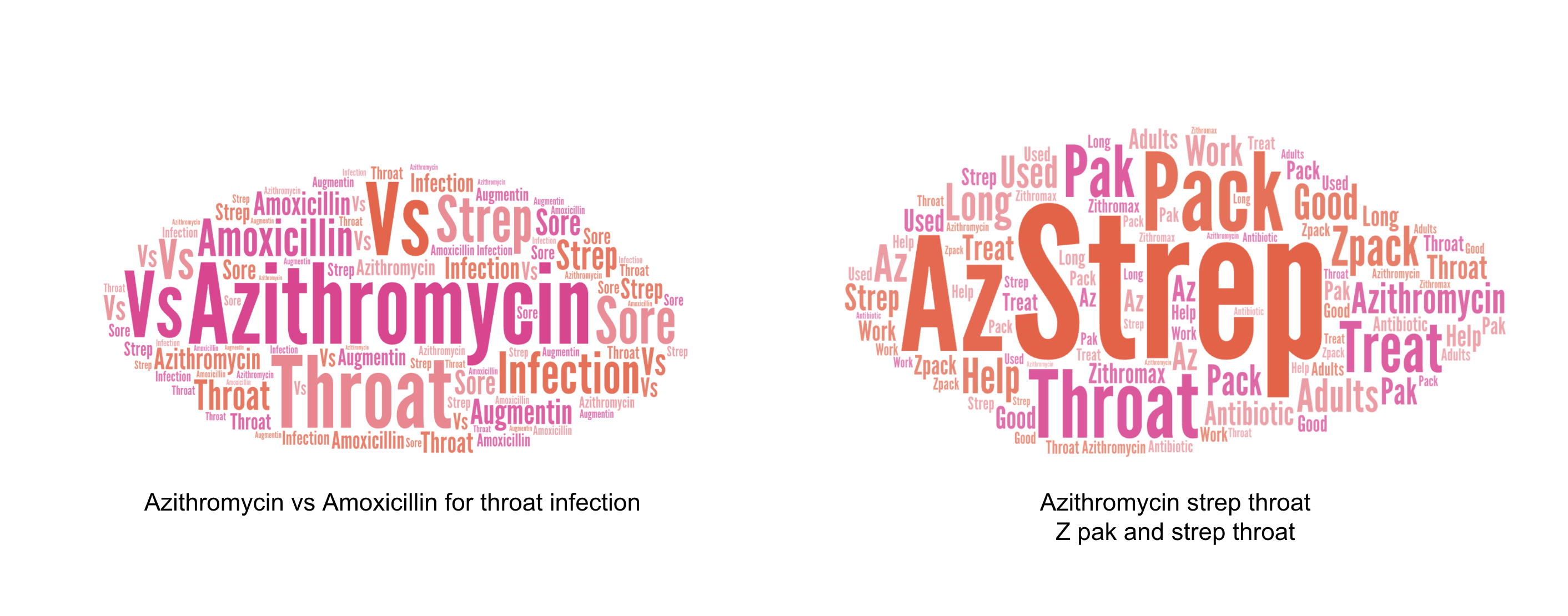 Screenshot from author, November 2023
Screenshot from author, November 2023Or “why certain medicines prescribed to help with blood pressure were also causing their patients to cough.”
 Screenshot from author, November 2023
Screenshot from author, November 2023The Bottom Line
I could have easily turned this guide into a tutorial on creating pivot tables or scripting OpenAI to categorize your keywords. But that wasn’t the heart of the matter.
My goal was to walk you through our unique, critical thinking process in tackling an unconventional and specific keyword research brief.
We needed to truly understand our audience and approach the task with a clear, testable hypothesis.
This particular client came to us after being told it was impossible to isolate keywords targeted solely at a specific demographic.
But here’s the thing: with the right amount of critical thinking, there’s almost always a way through.
And it’s not just applicable to healthcare. We’ve applied the same thinking to help HR companies zero in on keywords that resonate solely with HR professionals, steering clear of terms that employees might use.
I hope this insight encourages you to think outside the box in your own keyword quests. Happy hunting!
Also, I recommend reading “Tangental SEO: Finding Keywords For Content No One Else Has” as a follow-up reading.
More resources:
- 16 Best Keyword Research Tools For SEO
- Rank Tracking: How To Do It The Right Way
- Keyword Research: An In-Depth Beginner’s Guide
Featured Image: bleakstar/Shutterstock





